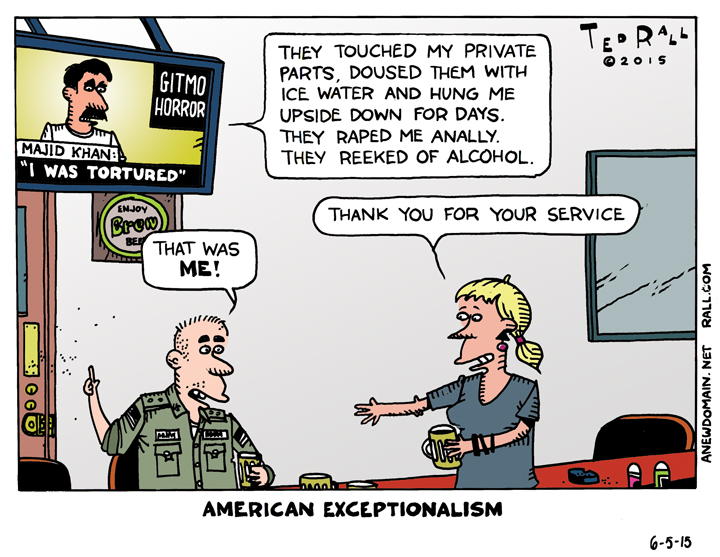
At the smallest, crappiest newspaper in the world – even at a high school paper – no sane editor would publish a story that wasn’t backed by solid evidence. As the 20th century print journalism cliché goes, if your mother says she loves you check it out. So why are the nation’s most prestigious multi-Pulitzer-winning newsgathering organizations repeatedly claiming that hackers working for the Russian government stole emails belonging to the Democratic National Committee and Hillary Clinton campaign manager John Podesta, and gave them to WikiLeaks?
Because the CIA says so.
Well, not the actual CIA. Some unidentified people who claim to have seen some report say so.
The charge against Russia is explosive. “In a ‘closed-door briefing on Capitol Hill last week,’ intelligence officials told senators that it was now “quite clear’ that electing Trump was Russia’s goal,” according to Vox. Hothead Sarah Palin enabler and senior Arizona Senator John McCain called it “an act of war.”
Even Times op-ed columnist Paul Krugman — historically a voice of reason and prescience — dove into the neo-Red-baiting morass of this weird month, writing that “bad guys hacked the election” thanks to “useful idiots” (a Cold War slur used against lefties like, um, Krugman, pinned here to Trump and his advisors).
(Hypocrisy alert! I’ll save my catalog of covert U.S. attacks against other nations’ democratic elections — Obama’s role in the recent coup in Honduras comes to mind — for some future book, a format where word counts aren’t as constricting.)
 Anyway, newspapers and magazines and radio and television and Internet news sites say that Russia was behind the hacks. So, as my editor at the Columbia Daily Spectator would surely have asked, what is the basis of this contention?
Anyway, newspapers and magazines and radio and television and Internet news sites say that Russia was behind the hacks. So, as my editor at the Columbia Daily Spectator would surely have asked, what is the basis of this contention?
“The CIA.’s conclusion does not appear to be the product of specific new intelligence obtained since the election, several American officials, including some who had read the agency’s briefing, said on Sunday,” wrote the Times’ Mark Mazzetti and Eric Lichtblau. “Rather, it was an analysis of what many believe is overwhelming circumstantial evidence — evidence that others feel does not support firm judgments — that the Russians put a thumb on the scale for Mr. Trump, and got their desired outcome.”
The primary basis of this “overwhelming circumstantial evidence” appears to be that whoever hacked the DNC also hacked the RNC but only released the DNC stuff to WikiLeaks. “If the Russians were going to interfere, why on earth would they do it to the detriment of the candidate that was pro-Russian?” asked Adam Schiff of California, the ranking Democrat on the House Intelligence Committee.
My editor at the Spec would not have been impressed.
As Sam Biddle writes at The Intercept, “you can’t help but notice all of the qualifying words: Possibly, appears, connects, indicates.”
This is one of those awkward times when you have to admit that Donald Trump has a point: why should we take the CIA, whose BS Iraqi WMD intel led to the deaths of over a million people, at its word?
Why would the very same journalists who let themselves get duped 13 years ago dutifully transcribe what amounts to nothing more than unsubstantiated allegations?
I don’t know if Russia is innocent of hacking those emails — any more than the New York Times and the Washington Post and CBS News and so on know that they’re guilty.
No one knows.
Well, the CIA (and the hackers, if there indeed were hacks) might know. But if the spooks have any evidence, much less proof, they aren’t showing it to us or those idiotic media outlets. Which makes this an unsourced story — and one whose geopolitical implications, involving the world’s most heavily-armed nuclear states makes it incomprehensibly, irredeemably irresponsible to spread around.
If the government wants to warn us that a Russian puppet is about to move into the White House, they ought to take a cue from JFK, who went on television to show secret US spy photos of Soviet missiles in Cuba.
Show us the evidence or shut up.
As if this “Russia hacked the election” episode wasn’t enough to showcase the intellectual bankruptcy of America’s state-controlled news media, the stenographers are ignoring a far more credible explanation for how WikiLeaks got the Podesta/DNC emails: they were leaked, not hacked.
Craig Murray, a former British ambassador to Uzbekistan and WikiLeaks associate, told The Daily Mail that a DNC insider motivated by “disgust at the corruption of the Clinton Foundation and the tilting of the primary election playing field against Bernie Sanders” personally gave it to him in Washington. “Neither of [the leaks] came from the Russians,” Murray says. “The source had legal access to the information. The documents came from inside leaks, not hacks.”
Murray is a paragon of integrity, having sacrificed his diplomatic career in order to call out Islam Karimov, the sadistic tyrant of Uzbekistan known for boiling political dissidents to death and his cozy ties to the U.S. (His account “Murder in Samarkand” is highly recommended for its brutal honesty.)
Regardless of your politics, Murray is infinitely more believable than the CIA.
WikiLeaks chief Julian Assange confirms that “the Russian government is not the source.” Assange too has an impeccable reputation.
As far as I can tell, only one U.S. outlet, the right-wing Washington Times, has covered the Murray angle.
Everyone “knows” that Russia hacked the election. But it may or may not be true. To the contrary! The facts point to a leak.
There is “overwhelming circumstantial evidence” that the moral midgets of American corporate media don’t have the slightest interest in uncovering the truth. How perfect as we enter the Age of Trump.
(Ted Rall is author of “Trump: A Graphic Biography,” an examination of the life of the Republican presidential nominee in comics form. Please consider supporting Ted’s hard-hitting political cartoons and columns and see his work first by sponsoring his work on Patreon.)




 Donald Trump wants to
Donald Trump wants to 